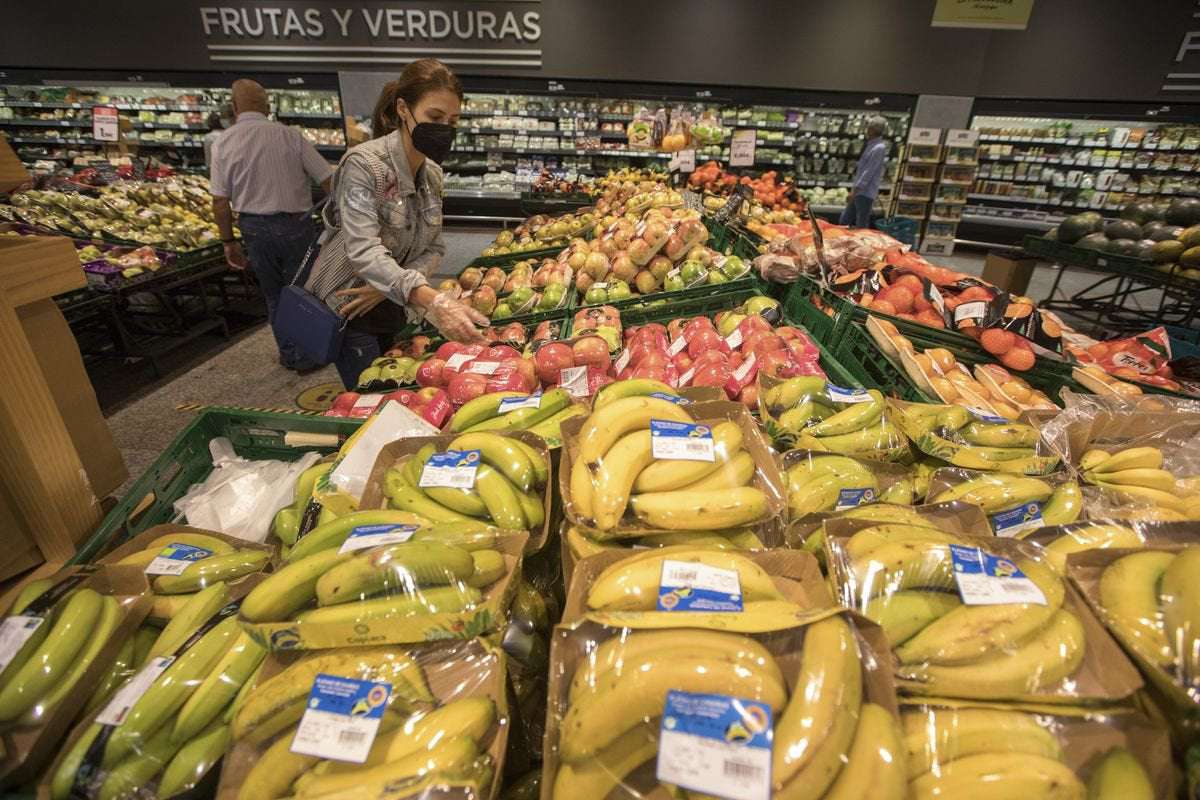The sale of fruit and vegetables in plastic wrapping will be prohibited in Spain’s supermarkets and grocery stores starting in 2023. This is one of the measures in a decree being drafted by the Ministry for Ecological Transition, according to sources familiar with the initiative.
The new regulation also contains measures to encourage the purchase of loose, unpackaged produce and use of non-bottled water. The ban on fruit and vegetable packaging will apply to produce weighing under 1.5 kilograms, following similar legislation in France, where it will go into effect next year.
The Spanish executive wants to “fight the overuse of packaging in the most effective way,” said a ministry spokesperson. The same source said that plastic pollution “has exceeded all limits.”
Environmental groups in Spain and abroad, including Greenpeace, have been campaigning for years to stop greengrocers and large supermarkets alike from wrapping fresh produce in layers of plastic.
We drink plastic, we eat plastic and we breathe plastic Julio Barea, Greenpeace
The ministry headed by Teresa Ribera has held meetings with leading business associations and environmental groups to share some of the main guidelines contained in the draft decree, which seeks to incorporate European Union norms to Spain’s legislation.
The list of products included in the new regulations will be set by the Spanish Food Safety and Nutrition Agency. Those “at risk of deteriorating when sold loose” will be left out of the list, according to available information.
Julio Barea of Greenpeace said he agrees with the ban but added that it is important to see “how it will be applied” in the end. Barea feels the government, led by a center-left coalition of the Socialist Party (PSOE) and leftist Unidas Podemos, is not moving fast enough “to radically end the flow of plastic pollution.”
“We drink plastic, we eat plastic and we breathe plastic,” he warns about the effects of a type of pollution he describes as “a pandemic.”
The decree also contemplates forcing authorities at every level of government to “encourage the installation of drinking fountains in public spaces” and “introducing alternatives to the sale of bottled drinks,” as well as rolling back “the distribution of single-use drinking cups” at public events, beginning in 2023, according to information shared with green groups.
The government is working on measures to encourage retailers to sell fresh produce without packaging. Customers could bring their own reusable containers, although hygiene conditions would have to be set by the establishments.
One of the main goals of the draft decree is to reduce by half the sale of plastic bottles for drinks by 2030, and for 100% of packaging on the market to be recyclable, according to the same sources.
The document differentiates between glass or hard plastic bottles, which can be reused, and the rest. Hotels, restaurants and cafeterias should be using reusable bottles at a rate of 50% by 2025, and by 2030 they should represent 60%. In the case of beer, the goals are 80% in 2025 and 90% in 2030. For soft drinks, the goals are 70% and 80%. The targets are much less ambitious when it comes to household consumption: 10% of all drink packaging should be reusable by 2025 and 20% by 2030.
One of the great battles of both this decree and the waste bill that is making its way through the Congress of Deputies is the implementation of a system of deposit and return for packaging, mirroring systems in some other EU countries. However, in Spain there is a dispute between environmental organizations that support this model and Ecoembes – the company in charge of managing most domestic packaging – which is fighting its implementation.
Carlos Arribas, head of the waste-research department at Ecologists in Action, explains that the ministry is leaving open the possibility of eventually introducing this system, which involves consumers leaving a few cents in deposit for each container, which they get back when they return it. The text of the bill that the executive sent to Congress in May was quite ambiguous on this subject.
The PSOE and Unidas Podemos last week agreed on a joint amendment in parliament to serve as a guide to what the coalition government intends to do. This deposit-and-return system will only be implemented if separate collection objectives for plastic bottles are not met. By 2023, at least 70% of the weight of packaging introduced in the market must have been collected for recycling; by 2027 this figure should reach 85%. If these goals are not met, the deposit-and-return system will be introduced, according to the amendment by the coalition partners. But environmentalists claim that the current system used to count the percentage of recovered packaging is not reliable. “We expect that the European Commission will unify the way in which this is counted,” said Arribas.

SinisterPixel on September 22nd, 2021 at 19:32 UTC »
I already try to buy as much of mine as I can loose, and will use either paper bags or reusable fabric bags. I'd love to see more places worldwide commit to 100% recyclable packaging
michaelsone92 on September 22nd, 2021 at 17:49 UTC »
Oh my God that picture is awful... why would you wrap bananas in plastic?!
Top-Orange-4342 on September 22nd, 2021 at 16:35 UTC »
FINALLYYYYYYYYY